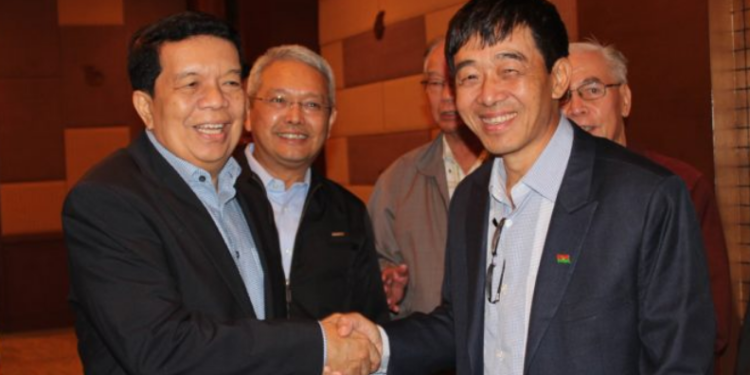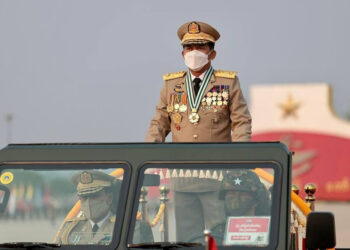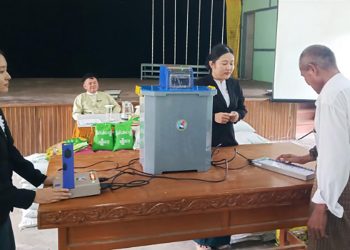CHIANG MAI, Thailand—The government’s decision to hold the first ever collective informal talks with all four members of the Northern Alliance, none of which have signed the Nationwide Ceasefire Agreement (NCA), in Kunming in China’s Yunnan Province is a positive step towards bringing more NCA signatories to the table for formal peace negotiations.
The decision to hold the talks came after a meeting between government peace negotiators and a Kachin Independence Organization’s (KIO’s) delegation led by Gen. Gun Maw in Kunming on Jan. 21, when the KIO proposed that the government delegation sit down for talks with all four members of the Northern Alliance bloc. Talks are proposed for mid-February.
The bloc, comprised of the KIO’s armed wing, the Kachin Independence Army (KIA), the Ta’ang Nationalities Liberation Army (TNLA), Kokang’s Myanmar National Democratic Alliance Army (MNDAA) and the Arakan Army (AA), was formed in late 2016 and is led by the KIA.
U Thein Zaw, vice chairperson of the government’s Peace Commission been leading negotiations with other ethnic armed groups in northern Shan State. The informal proposed talks are to be held with the objective of negotiating an agenda for formal talks inside the country, according to the Peace Commission, a peace negotiation body under the National Reconciliation and Peace Center.
“We will mainly discuss how to move towards signing the nationwide ceasefire agreement,” said U Khin Zaw Oo, the commission’s secretary and a key negotiator. However, a date is yet to be agreed on.
For the peace talks to move forward comprehensively, the government intends to hold formal meetings with these four groups in Naypyitaw, following which, the Tatmadaw (Myanmar Army) negotiation team would then meet the groups individually.
The four bloc members were included in a team which collectively drafted the NCA text with the Union Peace-making Work Committee in 2014 and 2015, but subsequently dropped out of the process after three of its members—the AA, TNLA and MNDAA—were denied equal inclusion in the peace process. As a consequence, there were heightened military tensions in Kachin and northern Shan State until a unilateral ceasefire was declared on Dec. 21 while sporadic clashes have continued to break out between the Tatmadaw and the AA in Rakhine State.
Although the Tatmadaw gave the green light to government negotiators to meet the four groups together as a collective bloc, the extent to which the groups can push forward in negotiating their demands remains to be seen.
The Tatmadaw has been engaged in battles with the AA in western Myanmar where it claims to be carrying out counter insurgency operations. It has also accused the Northern Alliance members of tormenting the public through forced recruitment, extortion, expanding their territories, creating interethnic armed conflicts and ambushing Tatmadaw troops. On Jan. 25 it ordered the groups to retreat from the Tatamaw’s areas of operation until next week and to enter peace talks with either the government or the Tatmadaw negotiation team.
Informal talks are also expected to take place between the government and a number of other individual armed groups including the Restoration Council of Shan State (RCSS), the United Wa State Army (UWSA), and Mongla’s National Democratic Alliance Army (NDAA) this month. Though the RCSS is an NCA-signatory, it suspended its participation in the joint ceasefire monitoring mechanism last November and has been holding negotiations with the government in order to get the formal talks back on track. The UWSA and the NDAA have only signed bilateral ceasefires and maintain that they don’t need to sign the NCA as they only want to take part in the political dialogue process and not make the commitments stipulated by the agreement.
KNU not ready for informal talks with the government
As peace negotiations with the northern groups slowly move forward, the government and the Karen National Union (KNU) have not yet been able to set a date for their next round of informal talks.
The KNU won’t be able to meet the government until after the third week of this month, as the members of the 10 NCA signatories are busy, according to Padoh Saw Kwe Htoo Win, the vice chairman of the KNU. The group said in January that it would only advance talks with the Tatmadaw after holding a meeting with all ten signatories of the NCA. Meanwhile, it will continue with informal talks.
The RCSS’ plan to meet the government and Tatmadaw leaders for formal talks this week did not happen either.
The Tatmadaw’s Jan. 25 statement made the armed groups—particularly the RCSS and KNU which had meetings scheduled—reconsider meeting the negotiation team and all signatory groups have postponed peace talks momentarily.
The RCSS will informally meet peace commission members at their headquarters in Loi Tai Leng, southern Shan State on Thursday during the 72nd Shan National Day celebrations, according to RCSS spokesperson Sai Meng. He said they have invited government and Tatmadaw representatives to their ceremony.
Peace council member U Aung Soe and advisor U Hla Maung Shwe will attend Thursday’s event. The government has also invited the NCA signatories to their Union Day celebration on Feb. 12 in Naypyitaw and further informal talks are expected to take place.
Because negotiations have been on and off, peace negotiators are optimistic about the upcoming talks.
“[We] hope the situation will improve,” added U Khin Zaw Oo, saying that informal talks are better than no dialogue at all.
The government will meet representatives of the Shan State Progressive Party (SSPP) for formal talks in Naypyitaw in the third week of February, according to the Peace Commission.

















